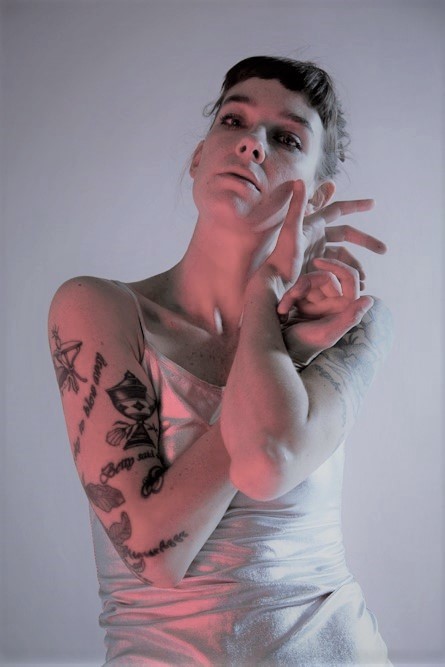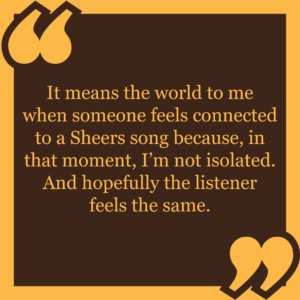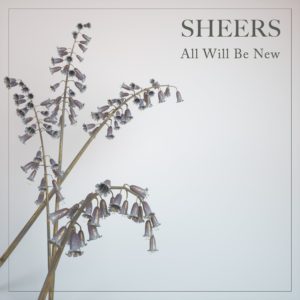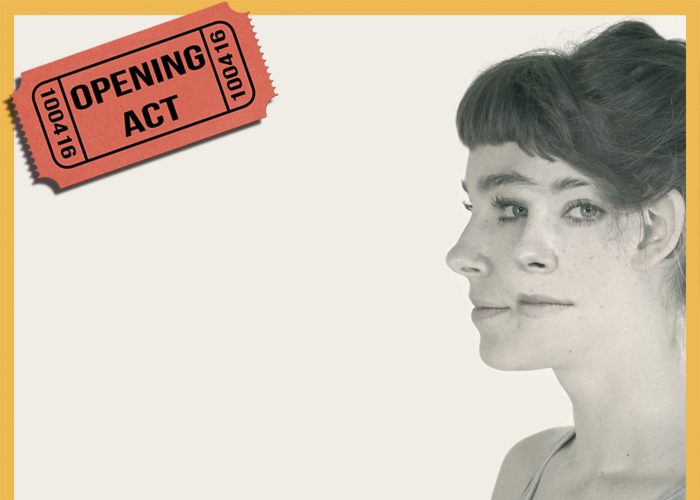
Artist/Band: Sheers
Members: Lily Breshears, Daniel Rossi, Aaron Stern
Website: www.sheers.bandcamp.com
Hometown: Portland, OR
Latest Album/Release: “All Will Be New”
Influences: Portishead, Maurice R avel, Einojuhani Rautavaara, FKA Twigs, Usher, James Blake, Mario
TrunkSpace: How do you describe your music?
Breshears: Brooding art pop.
TrunkSpace: You had a new music video for the track “All Will Be New” debut on November 7. Do you enjoy marrying visuals with your music, and if so, why?
Breshears: Definitely! So far I’ve mostly used visuals to enforce a mood that already exists in the music or to put a slight twist on it. It’s always a bit scarier of a task for me, though, as I often don’t have the sort of vocabulary needed to get my ideas across. And press photos are particularly scary… camera shyness is a real thing I haven’t gotten over yet.
TrunkSpace: What does this particular video do to build upon the song or emphasize a particular message? What is it saying that you couldn’t say with the track alone?
Breshears: Well, the lyrics I wrote for “All Will Be New” are admittedly floaty, but they feel right to me, like the mood I was trying to portray, so I was married to them immediately and still am. The video gave me the chance to make the lyrical ideas more concrete. I wanted to make a dissociation from reality happen, but retain a hunger for beauty. The connection between emotional and physical intimacy was something on my mind when writing the song, and the semi-anonymous metaphorical orgy seemed like the right image to portray an uncomfortable limbo within that intimacy.
TrunkSpace: You do some amazing things vocally throughout the course of “All Will Be New” where it feels like it almost becomes a wind instrument that blends beautifully within the music itself. Were those vocal fluctuations something you set out to do, particularly in the chorus, or was it an organic process that came out in the writing?
Breshears: Definitely an organic process. I remember writing the song in one afternoon, just a couple hours, so I made a lot of snap decisions. Like I said before, the song is dealing with dissociation and wanting more beauty and honesty, so there was this moment where I thought like, “Nah, I don’t get to sing this comfortably.” So I wrote it too high for my normal voice, and that takes me to different places every time we play it. The way my voice sounds because of that decision might turn people off, but I think it’d be much worse to give up on the original impulse. It should sound difficult and shaky.
TrunkSpace: What does your writing process look like? How does a song go from inception to completion?
Breshears: Usually it looks like me sitting at the piano or the harp playing notes at random then seeing where those notes want to go. Eventually I find something that absorbs me, and then I sit there more finding melodies with gibberish lyrics. The gibberish usually ends up telling me what the song is about. And then I make a map on a big piece of paper. And then sit on my porch finding realer words to replace gibberish. And then back at the piano with the map to see if those words need more music. And then drink beer on my porch, listen to it a thousand times, and go to bed, let my dream brain work on it if the song isn’t done yet.
Once in a while, though, a song starts with some lyrics and a melody. “All Will Be New” was one of those. Then it’s just a matter of figuring out what backing music is in your head behind the melody. I feel like those songs are usually the favorites and the easiest to write, but I also can’t will them into existence.
TrunkSpace: What is your favorite part of the songwriting process? What gives you the biggest thrill?
Breshears: You know when you’re having a particular kind of day or week and you find the song that has to be your soundtrack to it? So you listen to that song more than you’d care to share? When I finish a new song I’m really excited about, that song is the soundtrack to my day or week that I was missing, and then I get to listen to it too many times. And it’s so satisfying to have finished that song.
TrunkSpace: Many songwriters have said that the process is a bit like therapy for them. Do you find that to be the case with your own songwriting?
Breshears: Yeah, I’d say it is a bit like therapy, but by way of escapism for me. Maybe I get to be a different person for four minutes, or be more of the person I want to be than I normally am, or be one version of myself to the utmost extent. I’m generally such a logical and grounded person that going to those mindsets allows me to process things I wouldn’t otherwise.
TrunkSpace: Creative people are infamous for being extremely hard on themselves in the creative process. Does that apply to you, and if so, where are you hardest on yourself?
Breshears: I’m hardest on myself when it comes to playing live, which I do consider part of the creative process. For me, every show is like asking the audience if they feel the way I feel, so if the audience isn’t super responsive, I tend to turn inward and get discouraged. And even if the audience is receptive, I’ll find something to pick apart about my own performance.

TrunkSpace: What is your overall musical background? When did the bug first bite you, what instrument did you first pick up and learn from, and is Sheers your first project where you’ve presented your creative thoughts in a public atmosphere?
Breshears: I started playing piano and writing songs when I was four years old, so that bug bit me fast I suppose. I took piano lessons on and off as a kid, but ended up studying harp, singing, and music history in college. Sheers is my first time being songwriter/front person! After being a backing person in a couple Portland bands, I eventually needed my own outlet to hear exactly what I wanted.
TrunkSpace: What do you want people to take from your music? What messages do you hope they uncover and decipher in a way that they can apply to their own lives?
Breshears: The biggest thing is that I think people often expect “good music” to be easy to listen to, especially coming from female fronted bands. And that just doesn’t make any sense to me. I’ve had two different ex-boyfriends ask why I can’t just write prettier songs, and I’ve had many males say I should sing quieter or with more reverb. I write the way I do because I want to create “pop” music that demands active listening, that can coax listeners into appreciating tension, restraint and ugliness.
The other thing is that many of my songs, such as “All Will Be New” and the other recent single “Quantized,” are about feeling isolated and detached. But in performing them and recording them – like I said above – I’m asking the audience if they feel the way I feel. It means the world to me when someone feels connected to a Sheers song because, in that moment, I’m not isolated. And hopefully the listener feels the same. I think music is best for bringing people together in a way that’s not dependent on talking. I’m really just trying to do that with songwriting.
TrunkSpace: In your opinion, what is the biggest hurdle artists face these days? In a time where anybody can find anything online, is it no longer about delivering your message, but delivering it in a way that makes people take notice?
Breshears: Yeah, that’s a huge hurdle. There are so many songwriters and bands, good ones too, that it sometimes seems impossible to gain audiences without a schtick or an attention-grabby quirk. Or without making benignly trendy music that everyone can agree on for a bit. There’s also the issue of quantity, like small bands need to roll out new material constantly to get anywhere. But it’s really difficult to produce all that new material when you also need to hold down a day job or three because Spotify plays and show guarantees don’t pay the bills. I don’t know. I’m still trying to figure this stuff out. Email me if you have any advice.
TrunkSpace: What can fans expect from Sheers as we creep closer to 2018? What does the new year hold?
Breshears: We have a new EP called “An Occasion” that will be released early 2018! Also we’ll be putting out live videos over the next two months, so stay tuned for that. If anyone has early 2000’s R&B cover requests for harp, email me.


